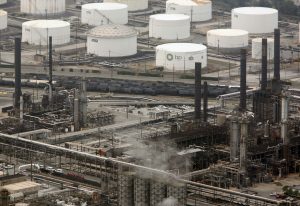
( REUTERS/John Gress (UNITED STATES)
An unplanned outage of a refinery in Indiana is sending gasoline prices higher in the upper Midwest.
The U.S. Energy Information Administration explained the BP-owned and operated refinery in Whiting, Indiana is the largest in the Midwest and has been offline since a power outage on Feb. 1. As a result, the EIA said spot petroleum product prices at the Chicago trading hub are increasing.
Although power to the refinery has been restored, it may remain offline for several weeks to resume operations, according to press.
Prices have increased more in Chicago for CBOB than on the U.S. Gulf Coast (PADD 3) following the outage. CBOB is a petroleum gasoline stock that refiners produce before blending it with fuel ethanol to make finished motor gasoline. Chicago prices for other refinery products, such as ultra-low sulfur diesel and jet fuel, have also increased.
Usually, Chicago petroleum product prices sell at a small discount to those on the U.S. Gulf Coast, largely because the Midwest region produces about as much refined petroleum products as it consumes. Before the outage, this discount was wider than usual. The relative price increase since the outage has brought Chicago petroleum product prices more in-line with the historical discounts.
Generally, the Midwest region produces enough petroleum products to satisfy regional demand and sometimes transfers products to states outside the region. During periods of planned or unplanned refinery outages, however, regional petroleum product prices tend to increase to attract products from other refining regions, particularly from the U.S. Gulf Coast.
Home to more than 50% of the country’s refinery capacity, the U.S. Gulf Coast produces far more fuel than it consumes. This surplus can be shipped to the Midwest or the U.S. East Coast (PADD 1), or it can be exported to other countries. Petroleum products can flow north from refineries on the U.S. Gulf Coast to the Midwest largely by pipeline during periods of limited supply or increased demand in the Midwest. In 2023 through November, about 300,000 b/d of motor gasoline, diesel, and jet fuel moved from the U.S. Gulf Coast to the Midwest, about 4% of Gulf Coast production.





